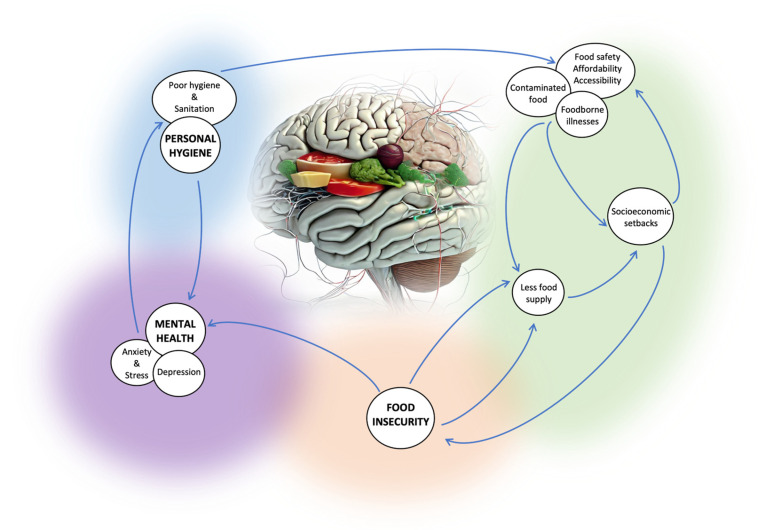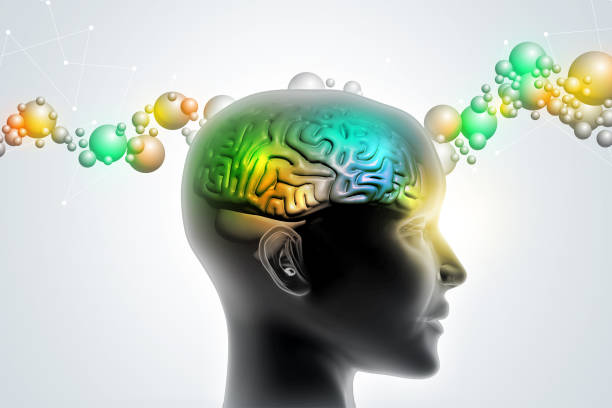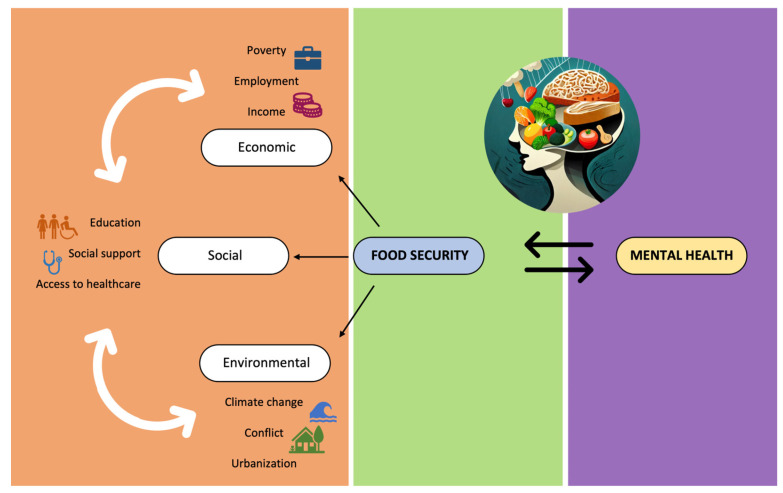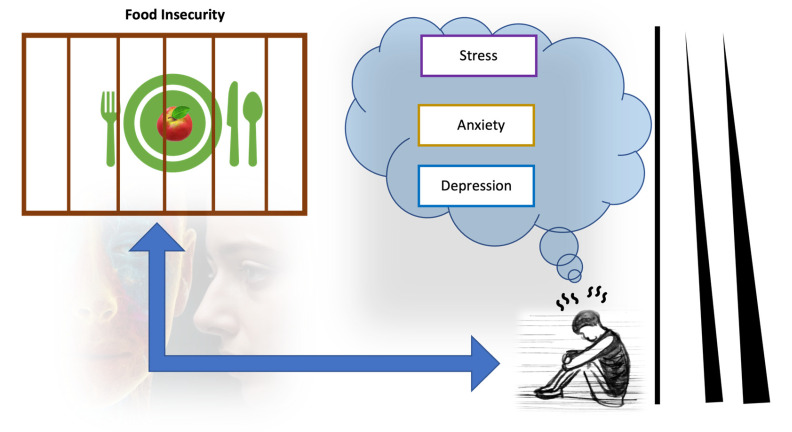
Personalized Approach:yes
Just as physical health requires personalized care, so does mental health. A nutrition-based treatment plan should be tailored to your unique needs and challenges.
Discover how specific foods, vitamins, and nutrients can positively impact mental health, alleviating symptoms of anxiety and depression, and fostering long-term emotional well-being through the power of diet.
Introduction: Understanding Nutritional Psychiatry

Nutritional psychiatry explores the link between diet and mental health, suggesting that specific foods and nutrients can positively impact brain function, mood, and mental well-being, potentially transforming mental health outcomes.
Here’s a deeper dive into the connection between nutrition and mental health:
- Nutritional Psychiatry Defined:This field examines how dietary choices influence brain health, neurotransmitter production, inflammation, and oxidative stress, all of which are crucial for mental well-being.
- The Brain’s Fuel:The brain requires a constant supply of nutrients from the foods we eat to function optimally, and what we eat directly affects brain structure and function, ultimately impacting mood and behavior.
- The Impact of Diet:
- Healthy Diet: A diet rich in vitamins, minerals, healthy fats, and fiber from fruits, vegetables, whole grains, nuts, and seeds can reduce inflammation and support healthy neurotransmitter function, potentially lessening symptoms of depression and other mental health conditions.
- Specific Nutrients: Certain nutrients, like omega-3 fatty acids, B vitamins, and magnesium, play a role in supporting brain function, neuroplasticity, and resilience to stress, which are crucial for managing mental health.
- Food Insecurity: Having access to safe and nutritious food can enhance mental well-being by alleviating the stress and anxiety associated with food insecurity.
- Food Choices: Food choices can influence neurotransmitter production, which are chemicals that transmit signals between brain cells and are essential for regulating mood and behavior.
- Practical Tips:
- Balanced Diet: Focus on a balanced diet that includes a variety of fruits, vegetables, whole grains, lean proteins, and healthy fats.
- Limit Processed Foods: Reduce consumption of processed foods, sugary drinks, and unhealthy fats, as they can negatively impact mood and mental health.
- Stay Hydrated: Drink plenty of water throughout the day, as dehydration can affect mood, energy levels, and cognitive function.
- Mindful Eating: Pay attention to your hunger and fullness cues, and avoid emotional eating.
- Consider Food Journaling: Keeping a food journal can help you identify any patterns or triggers related to your eating habits and mood.
- Seeking Professional Help:If you’re struggling with mental health, consider seeking guidance from a registered dietitian, psychiatrist, or other mental health professional who specializes in nutritional psychiatry.
- Personalized Approach:Just as physical health requires personalized care, so does mental health. A nutrition-based treatment plan should be tailored to your unique needs and challenges
Studies show that what we eat can either exacerbate or alleviate symptoms of anxiety, depression, and other mood disorders. Rather than relying solely on medication or therapy, nutritional psychiatry advocates for incorporating the right foods into your daily routine to foster a healthier brain and reduce mental health struggles. This approach blends science with practicality, offering evidence-backed dietary recommendations that can complement traditional treatment methods.
In this article, we will explore the connection between nutrition and mental health, discuss key nutrients that play a crucial role in mental well-being, and provide actionable advice on how to adjust your diet to help alleviate anxiety and depression. By understanding and applying the principles of nutritional psychiatry, you may be able to support your mental health in a more holistic, sustainable way
The Science Behind Nutritional Psychiatry
How Food Affects Your Brain and Mood
The brain is an incredibly complex organ, and its proper functioning relies on a variety of factors. Nutrients from the food we eat serve as the building blocks for neurotransmitters, hormones, and other chemicals that regulate mood, thought processes, and emotional responses.
Neurotransmitters like serotonin, dopamine, and GABA (gamma-aminobutyric acid) are essential for mood regulation. They influence everything from feelings of happiness and contentment to stress and anxiety. What you consume directly impacts the production of these neurotransmitters, which is why nutrition can play a pivotal role in managing mental health conditions.
For instance, serotonin, often called the “feel-good” neurotransmitter, is primarily made from the amino acid tryptophan, which is found in foods like turkey, eggs, and dairy. The availability of tryptophan in the bloodstream affects how much serotonin the brain can produce. This is just one example of how a diet rich in nutrients can impact the brain’s function and, by extension, our emotional health.
The Gut-Brain Connection

Recent research has also revealed the gut-brain axis, a direct communication pathway between the gastrointestinal system and the brain. The gut is home to trillions of bacteria that play an essential role in digestion, immune function, and even mood regulation. These gut microbes produce short-chain fatty acids and neurotransmitters that can influence how the brain reacts to stress, anxiety, and depression.
A healthy gut microbiome, achieved through a diet rich in fiber, probiotics, and fermented foods, is essential for maintaining mental well-being. In contrast, an unhealthy gut microbiome can contribute to conditions like irritable bowel syndrome (IBS), chronic inflammation, and even mental health disorders.
Understanding this connection underscores the importance of diet in managing mental health and the need for a holistic approach that incorporates both brain and gut health.
Key Nutrients for Mental Health
1. Omega-3 Fatty Acids: The Brain’s Best Friend
One of the most well-researched nutrients in the field of nutritional psychiatry is omega-3 fatty acids. These healthy fats are crucial for brain health, as they help form the structure of brain cells and regulate inflammation. Omega-3s, particularly EPA (eicosapentaenoic acid) and DHA (docosahexaenoic acid), are found in fatty fish like salmon, sardines, and mackerel, as well as in plant-based sources such as flaxseeds, chia seeds, and walnuts.
Studies have shown that people with depression and anxiety often have lower levels of omega-3s in their blood, and supplementing with these fatty acids has been linked to improvements in mood and cognitive function. Omega-3s have anti-inflammatory properties that help combat neuroinflammation, which is believed to play a significant role in mental health conditions.
Including omega-3-rich foods in your diet can not only boost brain health but may also be a natural, effective way to reduce symptoms of anxiety and depression.
2. B-Vitamins: The Stress-Busting Vitamins
B-vitamins, particularly B6, B9 (folate), and B12, are vital for maintaining proper brain function and regulating mood. These vitamins play key roles in the production of neurotransmitters and the breakdown of homocysteine, an amino acid that, at elevated levels, can increase the risk of depression.
Folate (B9) is involved in the production of dopamine and
Vitamin B6 helps in the synthesis of serotonin and GABA, two neurotransmitters that help regulate mood and reduce anxiety.
- Folate (B9) is involved in the production of dopamine and serotonin, both of which influence mood and emotions.
- Vitamin B12 is crucial for nerve function and is often deficient in people with depression, leading to symptoms such as fatigue and irritability.
Deficiencies in these vitamins can lead to mood swings, fatigue, and cognitive decline. B-vitamins are found in foods like leafy greens, eggs, poultry, fish, legumes, and fortified cereals. Ensuring adequate intake of B-vitamins is essential for mental health and can significantly reduce the risk of developing or worsening mood disorders.
3. Magnesium: The Calming Mineral
Magnesium is another nutrient that plays a significant role in mental health, particularly in managing anxiety and stress. This mineral is involved in over 300 biochemical reactions in the body, including those that regulate nerve function and muscle relaxation.
Magnesium helps promote the production of GABA, the neurotransmitter responsible for calming the nervous system. Studies have shown that magnesium deficiency can lead to increased anxiety, irritability, and restlessness. Conversely, adequate magnesium intake has been linked to reduced anxiety and improved sleep quality.
Foods rich in magnesium include leafy green vegetables, nuts, seeds, legumes, and whole grains. Magnesium supplements are also widely available, but it’s always best to get this mineral from food sources when possible.
Vitamin D: The Sunshine Vitamin for Mental Health
Vitamin D is essential for maintaining overall health, but it also plays a key role in regulating mood and preventing depression. Vitamin D receptors are found in regions of the brain that control emotions and mood. Studies suggest that low levels of vitamin D are associated with an increased risk of developing depression, particularly in people living in areas with limited sunlight.
The body can produce vitamin D when exposed to sunlight, but many people are deficient, especially in winter months or for those who spend most of their time indoors. Foods like fatty fish, fortified dairy, and egg yolks contain vitamin D, but many people may benefit from supplementation, particularly during the colder months.
5. Probiotics and Gut Health: A New Frontier in Mental Health
As mentioned earlier, the gut-brain axis is a powerful communication pathway, and research is increasingly showing that probiotics—live bacteria that promote a healthy gut—can have a significant impact on mental health. Probiotics can improve the balance of good bacteria in the gut, which in turn can reduce inflammation, regulate the production of neurotransmitters, and improve mood.
Fermented foods like yogurt, kefir, kimchi, sauerkraut, and kombucha are excellent sources of probiotics. Additionally, prebiotics—found in foods like onions, garlic, and bananas—feed the good bacteria in the gut, helping to maintain a healthy microbiome.
Incorporating both prebiotics and probiotics into your diet may be an effective strategy for improving your mental health and managing symptoms of anxiety and depression.
Diets That Support Mental Health
The Mediterranean Diet

The Mediterranean diet is often cited as one of the best diets for overall health, and it’s also particularly beneficial for mental well-being. Rich in fruits, vegetables, whole grains, lean proteins (such as fish and legumes), and healthy fats (especially olive oil), the Mediterranean diet is packed with the nutrients needed to support brain health.
Studies have shown that people who follow the Mediterranean diet are at a lower risk of developing depression and anxiety. The diet’s emphasis on omega-3 fatty acids, antioxidants, and anti-inflammatory foods makes it an ideal choice for those looking to improve their mental health naturally.
The Gut-Healing Diet: Focus on Fiber and Fermented Foods
As the science of the gut-brain connection continues to evolve, diets that focus on gut health are gaining traction. These diets prioritize high-fiber foods (such as vegetables, fruits, legumes, and whole grains) and fermented foods that promote a healthy gut microbiome. A healthy gut flora can influence everything from mood regulation to immune function.
The SAD (Standard American Diet), which is typically low in fiber and high in processed foods, sugar, and unhealthy fats, can contribute to poor gut health and, by extension, mental health issues. By switching to a more gut-friendly diet, you can support both your digestive system and your mental health.
Common Dieting Pitfalls and Their Impact on Mental Health
While it’s important to focus on a nutrient-rich diet to improve mental health, there are common dietary habits that can worsen anxiety and depression. These pitfalls can be detrimental to both physical and mental well-being, hindering progress toward better mental health.
1. Excessive Sugar and Processed Foods
Diets high in added sugars and processed foods have been linked to various mental health issues, including anxiety, depression, and mood swings. Refined sugars and highly processed foods cause blood sugar spikes and crashes, leading to fluctuations in energy levels and mood. These sharp fluctuations can also trigger feelings of irritability, fatigue, and emotional instability.
Research indicates that a high intake of sugary, processed foods may promote inflammation in the brain and disrupt the balance of neurotransmitters, both of which contribute to poor mental health. Additionally, these foods lack essential nutrients like vitamins and minerals, which are necessary for optimal brain function.
2. Caffeine and Alcohol: Short-Term Relief with Long-Term Consequences
Both caffeine and alcohol are substances that many people turn to in times of stress or when feeling low, but they can have negative effects on mental health in the long run. While caffeine can provide a temporary energy boost, it can also increase anxiety, particularly in sensitive individuals. High caffeine intake can disrupt sleep patterns, leading to increased fatigue and irritability, which can exacerbate anxiety and depression.
Similarly, alcohol may seem to offer temporary relief from stress, but it is a central nervous system depressant that ultimately worsens symptoms of anxiety and depression. Long-term alcohol consumption can disrupt brain chemistry and sleep, both of which are crucial for maintaining mental well-being.
Instead of reaching for caffeine or alcohol when feeling down, it’s better to focus on nutrient-dense foods and engage in relaxation techniques like deep breathing, meditation, or yoga, which can help reduce anxiety and improve mood more sustainably.
3. Skipping Meals and Nutrient Deficiencies
Another common pitfall is skipping meals or not eating regularly. This behavior can lead to nutrient deficiencies that affect both physical and mental health. For instance, missing meals can lead to imbalanced blood sugar levels, triggering mood swings, irritability, and fatigue. Furthermore, deficiencies in vital nutrients like iron, vitamin D, and magnesium can have direct consequences on brain function and mood regulation.
To prevent nutrient deficiencies, it’s important to eat balanced, regular meals that include a variety of nutrients. Incorporating whole grains, lean proteins, healthy fats, and a variety of fruits and vegetables can provide the necessary building blocks for optimal brain function and emotional stability.
Practical Tips for Implementing Nutritional Psychiatry
Integrating the principles of nutritional psychiatry into your daily routine may seem overwhelming at first, but there are simple, actionable steps you can take to make these changes.
1. Start with Small Changes
You don’t need to overhaul your entire diet overnight. Start by making small, gradual changes. For example, add one serving of leafy greens or berries to your daily meals, or swap processed snacks for a handful of nuts or seeds. Over time, these small changes will add up, and you’ll begin to experience the benefits.
2. Plan Balanced, Nutrient-Dense Meals
Planning ahead is key to ensuring you get the necessary nutrients throughout the day. Create meals that include a balance of macronutrients—healthy fats, proteins, and carbohydrates—as well as a variety of micronutrients from fruits, vegetables, and whole grains.
For example, a well-balanced meal might include grilled salmon (rich in omega-3s), quinoa (a whole grain packed with B-vitamins and magnesium), and steamed broccoli (rich in antioxidants and fiber). This combination of nutrients can support both brain and gut health, promoting better mental well-being.
3. Experiment with Gut-Boosting Foods
Focus on incorporating more fermented foods into your diet to support gut health. Start with small portions of foods like yogurt, kimchi, or sauerkraut, and gradually increase the amount over time. Consuming these foods regularly can help promote a healthy gut microbiome, which, in turn, supports mood regulation.
Additionally, ensure that you’re getting enough fiber from whole grains, fruits, vegetables, and legumes. A high-fiber diet can nourish beneficial gut bacteria, which may help improve symptoms of anxiety and depression.
4. Stay Hydrated
Dehydration can lead to irritability, fatigue, and difficulty concentrating, all of which can worsen mental health symptoms. Make sure you’re drinking enough water throughout the day—aim for at least eight 8-ounce glasses of water, depending on your activity level and climate. Staying hydrated is a simple yet effective way to support both your physical and mental well-being.

5. Supplement Wisely
While it’s always best to get nutrients from food, some individuals may need supplements to address deficiencies. If you’re concerned about your intake of specific vitamins or minerals, consider discussing supplementation with your healthcare provider. For example, omega-3 supplements can be an effective way to increase your intake of healthy fats if you don’t eat enough fatty fish. Vitamin D supplements may be necessary for individuals who don’t get enough sunlight or live in northern climates.Conclusion:
Nutritional psychiatry offers a promising and holistic approach to mental health, recognizing that the foods we eat have a direct impact on how we feel and think. From improving brain function and emotional regulation to supporting gut health and reducing inflammation, the power of nutrition cannot be underestimated when it comes to managing anxiety, depression, and other mood disorders.
By focusing on nutrient-dense foods—such as omega-3 fatty acids, B-vitamins, magnesium, probiotics, and antioxidants—you can create a diet that supports mental health in a way that complements, and even enhances, traditional therapies. Incorporating whole foods like leafy greens, fatty fish, and fermented foods into your meals can provide the essential nutrients needed for optimal brain and emotional function. Additionally, avoiding processed foods, excessive sugar, and alcohol will help prevent mental health pitfalls and promote a more balanced and stable mood.
While the science of nutritional psychiatry is still evolving, research strongly supports the idea that diet plays a crucial role in mental well-being. By understanding how nutrition influences brain chemistry and emotional regulation, individuals can take charge of their mental health through thoughtful dietary choices. It’s important to remember that small, sustainable changes over time are often more effective than drastic, short-term modifications. Whether you’re looking to alleviate anxiety, combat depression, or simply improve overall mental wellness, the principles of nutritional psychiatry provide a powerful and natural avenue for self-care and healing.
Q&A Section:
Q: How long does it take to see results from dietary changes in managing anxiety or depression?
A: It varies by individual, but many people begin to notice improvements within a few weeks to a couple of months of making dietary adjustments. Consistency is key.
Q: Can I rely solely on diet to treat anxiety or depression?
A: While diet plays a significant role, it’s most effective when combined with other treatments like therapy, medication, or exercise, depending on individual needs.
Q: Are there any risks associated with starting a nutritional psychiatry-based diet?
A: Generally, there are no risks, but if you’re making drastic changes or have pre-existing health conditions, it’s best to consult with a healthcare provider or a registered dietitian.
Q: What’s the best type of omega-3 supplement for mental health?
A: Omega-3 supplements with higher levels of EPA and DHA, derived from fish oil or algae, are commonly recommended for mental health benefits.
Q: How can I improve my gut health to support better mental well-being?
A: Consuming probiotic-rich foods (like yogurt, kimchi, or sauerkraut) and prebiotic-rich foods (like garlic, onions, and bananas) can improve gut health and positively affect mental health.
Q: Should I completely avoid caffeine if I suffer from anxiety?
A: Not necessarily, but moderation is key. Caffeine can increase anxiety for some people, so it’s important to gauge how it affects you personally and adjust accordingly.
Q: Can a plant-based diet help with managing mental health?
A: Yes, a well-planned plant-based diet can provide all the essential nutrients needed for mental well-being. Focus on foods rich in omega-3s (like flaxseeds), B-vitamins, and antioxidants.
Q: Is there a specific food that has been shown to drastically improve mood?
A: While there isn’t one “magic” food, fatty fish, dark leafy greens, and fermented foods have consistently been linked to better mental health outcomes due to their nutrient profiles.
Q: How important is vitamin D for mental health?
A: Vitamin D is crucial for mood regulation, and deficiency has been linked to increased risk of depression and anxiety. It’s important to get enough vitamin D through sun exposure, food, or supplements.
Q: Can I take supplements to help with anxiety and depression instead of changing my diet?
A: Supplements can be helpful, but a balanced diet is the foundation for mental health. Supplements can complement dietary changes, but they shouldn’t replace a nutrient-rich diet.